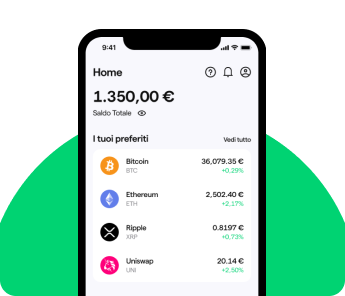Discover how Young Platform can enhance your business through cryptocurrencies. Explore our range of business services.
Businesses are rapidly adopting Bitcoin and other cryptocurrencies. Merchants, large corporations, and institutions are embracing these digital assets for various reasons, including investment opportunities, operational optimization, and direct customer engagement.
Businesses range from small merchants accepting cryptocurrency payments to large corporations integrating Bitcoin into their treasury operations to hedge against inflation and economic instability, taking advantage of this scarce, anti-inflationary asset. Furthermore, thanks to specialized service providers, cryptocurrency can now be used to purchase various goods and services, including cars, houses, airline tickets, groceries, and much more.
Innovation is thriving in various sectors, especially in sports. Organizations like the NBA and football teams such as Juventus are utilizing tokens to engage with their fans, providing opportunities for them to vote and interact with the club. Meanwhile, asset tokenization is transforming industries like real estate and art, creating new investment avenues.
Cryptocurrencies represent a new frontier in digitizing value, offering exceptional opportunities across multiple fields. Companies like Young Platform, a Turin-based cryptocurrency exchange, have created customized B2B services designed to help businesses, institutions, and non-profit organizations maximize the advantages of the crypto market. These services include strategic investments, payment optimization, and effective fundraising tools.
This article will explore how your company can integrate cryptocurrencies into its business strategy, taking advantage of opportunities while addressing any challenges with a clear and prepared vision. To successfully navigate this new era, companies should consider three fundamental questions:
1. What benefits can cryptocurrencies bring to my company?
2. Why do we want to adopt cryptocurrencies?
3. What factors must we consider to ensure a safe and effective implementation?
Visit our business page
What can cryptocurrencies do for my company?
Adopting cryptocurrencies can provide significant advantages and create new opportunities for your company. Firstly, cryptocurrency users tend to belong to a cutting-edge demographic: they are tech-savvy, innovation-focused individuals who typically have above-average disposable income. This target audience, which favors premium and luxury services, presents an appealing niche for companies seeking to position themselves as innovative and forward-thinking.
Moreover, embracing cryptocurrencies is a strategic move to attract this audience and aligns your company with a European context where central bank digital currencies (CBDCs) are developing. Currently in the testing phase, these instruments could become integral to the digital economy in the coming years. Thus, adopting cryptocurrencies is a proactive step towards an already unfolding future.
Cryptocurrencies offer innovative features and serve as a promising investment option, providing a digital liquidity alternative. They present opportunities to enhance traditional treasury functions, particularly international money transfers, which often incur high costs and lengthy processing times. Utilizing cryptocurrencies can significantly reduce these inefficiencies, allowing for better management of corporate capital and helping to mitigate the risks posed by inflation, which can erode cash value over time.
The long-term investment potential of cryptocurrencies is evident, especially considering Bitcoin’s exponential growth. Bitcoin has achieved remarkable peaks in recent years, solidifying its status as a valuable asset.
Discover our services
Three key aspects of integrating cryptocurrencies into business
If your company plans to incorporate cryptocurrencies into its business strategy, you must consider three key elements:
Long-term perspective
Cryptocurrencies are characterized by their volatility, which can pose significant risks in the short term. Therefore, it is advisable to view them as long-term investments, enabling more thoughtful decisions and reducing exposure to sudden fluctuations.
Regulation and compliance
Adopting cryptocurrencies necessitates careful consideration of European and tax regulations. For instance, the Markets in Crypto-Assets (MiCA) regulations oversee the cryptocurrency market, while Italy’s 2023 Budget Law addresses the taxation of capital gains from such investments. Understanding and complying with these regulations is crucial to avoid potential legal or tax problems.
What is MiCA, and what does the European regulation mean for crypto?
Transaction optimization
Cryptocurrencies provide exceptional efficiency for business-to-business transactions. Their decentralized nature allows for a significant reduction in transaction costs—up to 5,000 times lower—and greatly enhances execution speed—up to 430,000 times faster. This makes them an ideal option for conducting business transactions globally.
Enabling cryptocurrency payments: the ‘Hands-Off’ approach
Why do we want to adopt cryptocurrencies?
Many companies adopt cryptocurrencies primarily to facilitate payments without directly managing digital assets. This ‘hands-off’ approach involves automatically converting received cryptocurrencies into fiat currency through a specialized B2B service provider, allowing companies to keep cryptocurrencies off their corporate balance sheets.
By adopting this model, which utilizes cryptocurrencies such as stablecoins (pegged 1:1 to the value of the euro and dollar) or layer two solutions, businesses can quickly enter the world of digital assets. This strategy enables companies to accept cryptocurrency payments, reach new customer segments, and increase transaction volume without significantly changing their operational structures or directly handling the technical complexities associated with cryptocurrencies.
Because cryptocurrencies are converted into fiat currency immediately, they do not appear on the company’s financial statements. This method simplifies tax matters and reduces exposure to the cryptocurrency market’s volatility.
Third-party providers, such as Young Platform, handle conversions, payments, and technical and compliance issues. These include adhering to anti-money laundering (AML) regulations and customer verification (KYC) procedures when opening a Business Wallet for your company. While the company can delegate these tasks, it must still comply with current regulations.
Read more on this topic:
Download the payments report
Integrating cryptocurrencies into the Treasury
When a company goes beyond merely enabling cryptocurrency payments, it can implement more advanced strategies to incorporate digital assets into its operations and treasury management. These strategies may include accepting cryptocurrency payments without automatically converting them to fiat currency or allocating a portion of the corporate treasury to cryptocurrencies like Bitcoin.
Bitcoin, the first cryptocurrency, has been one of the best-performing assets of the past decade. It has also shown remarkable resilience during economic crises, such as the COVID-19 pandemic. Using cryptocurrencies as a reserve in the treasury has become a popular strategy to combat the effects of long-term inflation.
For example, in the past 10 years, Apple has lost $15 billion due to inflation—an issue that assets like Bitcoin could help alleviate.
Treasury Management
Cryptocurrencies held for treasury purposes are managed through digital wallets (business wallets), which require a robust structure to ensure security and accessibility.
1. Hot Wallet: This type of wallet is used for everyday transactions, providing quick access to cryptocurrencies.
2. Cold Wallet: This wallet is utilized for long-term holdings and protects assets by keeping them offline, offering greater security.
Young Platform employs Fireblocks, one of the most advanced and trusted custody platforms globally, for its custody services. By adopting a multi-layered structure that combines hot wallets for daily transactions with cold wallets for long-term custody, Young Platform ensures optimal protection against potential threats. Additionally, it follows a one-to-one custody model, guaranteeing that customers’ cryptocurrencies are never lent out or used for other purposes.
Tax and compliance aspects
Adopting cryptocurrencies comes with fiscal responsibilities that need to be managed effectively. To assist with these complex issues, third-party providers like Young Platform offer tailored support to business customers looking to integrate cryptocurrencies into their operations. Each business is assigned a personal account manager who helps develop and implement a customized strategy from the options available in our B2B Hub. This includes managing cryptocurrency payments, either by holding them as digital assets or converting them automatically into fiat currency.
Additionally, the account manager helps create a long-term treasury strategy, which is valuable for optimizing the management of digital assets and achieving specific financial goals.
Young Platform also features an integrated tax hub that provides all the necessary documentation for tax reporting and offers personalized advice from experienced accountants in the cryptocurrency sector. This service ensures compliance with current regulations and minimizes companies’ risks and operational challenges.
For more on this topic:
Download the treasury report
From Peer-to-Peer Value to Decentralised Finance
Cryptocurrencies represent a significant revolution by enabling peer-to-peer value transfers without intermediaries. This unique feature naturally led to their initial application in finance, resulting in a complex and dynamic market known as Decentralized Finance (DeFi).
Within the DeFi space, users can access services that were once exclusive to the traditional financial system, such as earning interest, taking out loans, and managing wealth. These transactions occur through decentralized protocols, using blockchain technology to ensure transparency, security, and automation—all without the involvement of central institutions.
Third-party providers have intuitive infrastructures and user-friendly interfaces for companies looking to explore DeFi securely and straightforwardly. These tools enable even those without technical expertise to access DeFi services without navigating the complexities of the underlying protocols.
One example of this is staking services, which provide companies with an easy way to convert passive resources into productive assets and create new streams of passive income.
What is Staking?
Staking, in its simplest form, involves locking cryptocurrencies in a protocol to help support the network. This process contributes to the security and validation of transactions while allowing the cryptocurrencies to remain the user’s or company’s property. During the staking period, these assets are temporarily unavailable for other transactions.
Participants are incentivized to stake their cryptocurrencies through periodic rewards, similar to earning interest. The Annual Percentage Yield (APY) can vary widely depending on the protocol, ranging from 3% to over 20%.
Another advantage of staking on Young Platform is flexibility. If liquidity is needed, the release time for staked assets is relatively short, typically between 3 to 20 days.
Ethereum is a particularly popular example of staking, the second largest and most established cryptocurrency after Bitcoin. Ethereum also serves as the foundation for Decentralized Finance (DeFi), which is why many companies focus their staking projects on this asset.
For more on this topic:
Download the staking report
Planning cryptocurrency implementation: a strategic approach
What aspects must we consider to do this safely and effectively?
Integrating cryptocurrencies into business operations requires a clear and structured implementation plan, like any technological innovation. This process not only initiates organizational and operational changes but also necessitates a shift in mindset within the company.
To create an effective strategy, the implementation plan must address several key questions:
- What short- and long-term goals do you want to achieve?
- Will the company limit itself to using cryptocurrencies for payments, or will it adopt a broader strategy?
- What internal and external collaborations are essential for success?
- Do current decisions allow for broader adoption of cryptocurrencies in the future?
- How will you integrate the security needs of the crypto ecosystem with existing corporate cybersecurity policies?
- What additional resources will be required beyond those currently available?
- What new skills or tools need to be introduced?
- How will the implementation roadmap be structured?
- What processes will be used to monitor progress, transaction execution, and supplier performance?
Before committing to full implementation, many companies choose to conduct a ‘pilot project,’ similar to how they would approach a new technology.
A practical example of cryptocurrency adoption is an internal pilot project managed by the Treasury Department, which oversees the company’s and its subsidiaries internal financing. The process may include:
1. The initial purchase of cryptocurrencies.
2. The use of these resources for peripheral payments.
3. Monitoring transactions, from payment to receipt and revaluation of assets.
This pilot project helps identify opportunities and challenges as a contrasting medium, highlighting the potential benefits and operational difficulties of adopting cryptocurrencies.
The Importance of Training
Team training is essential for the success of any project, regardless of its scale. While many market solutions are designed to be user-friendly, having a basic understanding of the industry enhances the management of digital resources and helps identify new business models.
Young Platform provides B2B training services that assist companies in implementing customized strategies to leverage blockchain technology’s potential.
Our offerings include:
- Tailored Courses: E-learning modules that provide a comprehensive sector overview, including current regulations.
- Vertical Workshops: Specialized training sessions to develop specific skills for dedicated teams, such as legal, tax, or technology.
- B2B2C Pathways: Targeted training solutions for customers to optimize their use of business services and promote greater adoption.
For more on this topic:
- Why include blockchain in corporate training
Download the training report
A well-planned implementation of cryptocurrencies can significantly transform business operations, but it requires a thoughtful strategy and a step-by-step approach. By experimenting with a pilot project, investing in team training, and collaborating with experienced providers, you can effectively navigate the challenges and capitalize on the opportunities presented by this innovation. Please contact your account manager to learn which business services best meet your needs.
You might be interested in:
- Crowdfunding in crypto: all the advantages and how to do it
- Corporate welfare: what is it and how does it work?
Visit our business page











